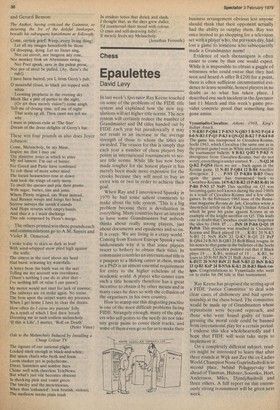Epaulettes
David Levy
In last week's Spectator Ray Keene touched on some of the problems of the FIDE title system and explained how the new regulations will set higher title norms. The new system will certainly reduce the number of Grandmaster and IM titles handed out by FIDE each year but paradoxically it may not result in an increase in the average strength of those to whom the titles are awarded. The reason for this is simply that each year a number of chess players buy points in international tournaments to secure title norms. While life has now been made tougher for the honest player it has merely been made more expensive for the crooks because they will need to buy an extra win or two in order to achieve their goal.
When Ray and I interviewed Spassky in 1970 he had some salient comments to make about the title system. 'This is a big problem because there is devaluation in everything. Many countries have an interest to have some Grandmasters but nobody thinks about really strong players, just about documents and epaulettes and so on. It is crazy. We are living in a crazy world.' Coming from Eastern Europe Spassky well understands why it is that some players resort to bribery to obtain their titles. In communist countries an international title is a passport to a lifelong career in chess, much as a PhD is an almost essential requirement for entry to the higher echelons of the academic world. A player who cannot earn such a title honestly therefore has a great incentive to obtain it by other means and in many cases he does so with the collusion of the organisers in his own country.
How to stamp out this disgusting practice is one of the msot difficult problems facing FIDE. Strangely enough, many of the players who sell points to the needy do not take any great pains to cover their tracks, and some of them even go so far as to make their business arrangement obvious lest anyone should think that their opponent actually had the ability to outplay them. Ray was once invited to go shopping for a television set with a player who, the previous day, had lost a game to someone who subsequently made a Grandmaster norm!
Evidence of such shenanigans is often easier to come by than one would expect.
While it is impossible to obtain a gaggle of witnesses who could swear that they had seen and heard A offer B £200 for a point, there is often sufficient circumstantial evidence to leave sensible, honest players in no doubt as to what has taken place. I described one such incident in the Spectator last 11 March and this week's game provides concrete proof that something has gone amiss.
Vyza ntiad is-C ioca [tea : Athens 1968, King's Indian Attack.
1 N-KB3 P-QB4 2 P-KN3 N-QB3 3 B-N2 P-Q4 4 0-0 N-B3 5 P-Q3 P-K3 6 QN-Q2 B-K2 7 P-K4 0-0 The game has transposed to Ciocaltea-Kozma, Sochi 1963, which Ciocaltea (the same one as in the present game) won as White and annotated in the tournament bulletin. 8 R-Kl Q-82 9 P-K5 A divergence from Ciocaltea-Kozma, but do not worry, everything is under control. 9. . .N-Q210 Q-K2 P-QN4 Here we are — back again in the Kozma game. 11 N-B1 P-QR4 12 B-B4 Another divergence. 2 . . . P-N5 13 P-KR4 B-R3 Once again the game has transposed back to Ciocaltea-Kozma. 14 N-K3 R-R2 15 P-R5 R-B1 16 P-R6 P-N3 17 NxP! This sacrifice on 05 was becoming quite well known during the mid-1960s as a result of Ciocaltea-Kozma and a few other games. In the February 1965 issue of the Romanian magazine Revista de Sah, Ciocaltea wrote a theoretical article on the King's Indian Attack in which he gave his game against Kozma as an example of the knight sacrifice on 05. This leads one to doubt that Ciocaltea could have forgotten the idea by 1968. 17 . . . PxN 18 P-K6 Q-Q1 19 PxPch This position was reached in CiocalteaKozma and Black played 19 ... K-R1 20 N-K5 N-B3 21 NxN RxN 22 0-K5 R-03 23 BxP B-0N4 24 B-N5 B-0B3 25 BxB Black resigns. In his notes to that game in the bulletins of the Sochi tournament, Ciocaltea pointed out that if Black plays 19 ... K-B1, instead of 19 ... K-R I , he loses to 20 N-N5 BxN 21 BxB. And so. .. 19. . . K-B1!!! 20 N-N5 MN 21 BxB N-B3 22 BxN R-K2 23 Q-B3 KxP 24 B-N7ch K-K1 25 B-R3 Black resigns. Congratulations to Vyzantiadis who went on to make his IM title in that tournament.
Ray Keene has proposed the setting up of a FIDE 'Justice Committee' to deal with clear cases of dishonesty and bad sports manship at the chess board. The committee would be made up of Grandmasters whose reputations were beyond reproach, and those who were found guilty of transgressing the moral code could be banned from international play for a certain period. I endorse this idea wholeheartedly and I hope that FIDE will soon take steps to implement it.
On a completely different subject, readers might be interested to learn that after three rounds at Wijk aan Zee the ex-Ladies World Champion Nona Gaprindashvili is in second place, behind Polugayevsky but ahead of Timman, Hubner, Sosonko, Hort, Andersson, Miles, Djindjihashvili and three others. A full report on this enormously strong trounament will be given next week.


































 Previous page
Previous page